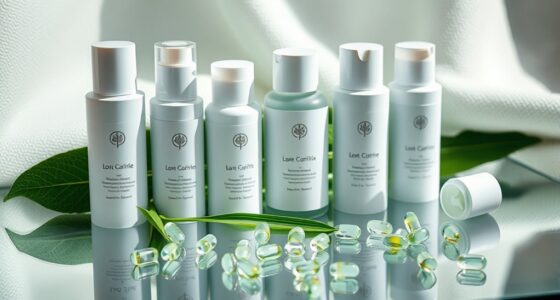When choosing a peptide serum, look for products with scientifically proven peptide chains like palmitoyl pentapeptide-4 or hexapeptide-9. Avoid vague labels and marketing buzzwords that don’t specify ingredients or concentrations. Genuine peptides are often backed by clinical studies confirming their ability to stimulate collagen and improve skin firmness. To get the most out of your serum, focus on quality formulations and proper application techniques—there’s more to learn if you stay curious.
Key Takeaways
- Verify peptide products list specific, scientifically supported amino acid chains proven to stimulate collagen.
- Recognize that marketing buzzwords like “peptide complex” may lack evidence of actual effective chains.
- Check for clinical studies or ingredient transparency confirming the presence of proven peptide sequences.
- Understand that formulation quality, including proper packaging and botanical support, enhances peptide efficacy.
- Prioritize brands that emphasize evidence-based ingredients over clever branding to ensure real skin benefits.

Have you ever wondered how some skincare products deliver noticeable results so quickly? It’s often because they contain ingredients backed by science, like peptides, but also because of how you apply them. When it comes to peptide serums, understanding the role of botanical extracts and application techniques can make all the difference in achieving visible improvements. Not all formulas are created equal, and the key lies in identifying those with clinically proven chains of peptides rather than clever branding.
Peptide serums work by delivering small chains of amino acids that stimulate collagen production and improve skin elasticity. But their effectiveness depends heavily on formulation. Some products boast impressive ingredient lists filled with botanical extracts—like green tea, centella, or chamomile—that soothe the skin and provide antioxidant benefits. While these natural components enhance the serum’s overall nourishing qualities, they also support the action of peptides, helping them penetrate deeper and work more efficiently. When choosing a peptide serum, look for formulations that combine these botanical extracts with scientifically supported peptide chains, rather than just marketing buzzwords.
Application techniques play a vital role in maximizing the benefits of peptide serums. Properly applying your serum ensures that the active ingredients reach the skin’s deeper layers where they can do their best work. Start with a clean, dry face; applying the serum to damp skin can enhance absorption. Use gentle, upward strokes to spread the serum evenly across your face and neck, avoiding harsh rubbing that can irritate the skin. A good rule of thumb is to wait a few minutes after cleansing and before moisturizing, allowing the peptides to penetrate fully. Consistency is key—daily application yields the most noticeable results over time.
Moreover, understanding the packaging of your peptide serum can influence its efficacy. Serums stored in opaque, airtight containers protect sensitive peptides from light and air, which can degrade their potency. Applying the serum correctly—using clean fingertips or a dropper—also prevents contamination and maintains ingredient integrity. When you combine the right application techniques with a serum containing verified peptide chains and beneficial botanical extracts, you’re setting the stage for real, visible improvements in your skin’s firmness and texture.
Frequently Asked Questions
How Long Does It Take to See Results From Peptide Serums?
You’ll typically see results from peptide serums in about 4 to 6 weeks, depending on ingredient interactions and your skin type. Consistent application techniques, like applying the serum after cleansing and before moisturizer, help optimize their effectiveness. Keep in mind, individual responses vary, so patience is key. Stick with your routine, and you’ll likely notice improvements in firmness and texture over time.
Are Peptide Serums Safe for Sensitive Skin Types?
You might wonder if peptide serums are safe for sensitive skin. While generally safe, there’s an allergy risk if you have allergies to certain ingredients. Look for formulations designed for sensitive skin, as they tend to have enhanced formulation stability, reducing irritation. Always do a patch test first to confirm your skin tolerates the serum. Choosing reputable brands with transparent ingredient lists helps you avoid adverse reactions.
Can Peptide Serums Replace Other Anti-Aging Treatments?
They say, “Don’t put all your eggs in one basket,” and that applies here. Peptide serums can complement your anti-aging routine, but they shouldn’t entirely replace treatments like retinoids or Botox. Ingredient comparisons show peptides target collagen, but application techniques matter for effectiveness. Use them as part of an all-encompassing approach, combining proven treatments with peptides for best results. Think of it as a balanced diet for your skin.
What Are the Best Storage Practices for Peptide Serums?
You should store peptide serums in a cool, dark place to maintain packaging stability and prevent degradation. Keep them away from direct sunlight and temperature fluctuations, as they are temperature sensitive. Always tightly seal the bottle after each use to avoid contamination and oxidation. Check the manufacturer’s instructions for specific storage guidelines, but generally, refrigeration can extend their shelf life and preserve their effectiveness.
Do All Peptide Chains Have the Same Effectiveness?
Think of peptide chains like different musical notes—some hit the right tone, others miss. Not all peptides are equally effective; their success depends on factors like peptide synthesis and how well they penetrate your skin. You want peptides optimized for skin absorption, ensuring they reach target cells. So, while some chains boost collagen, others may fall short, making it essential to choose serums with proven, effective peptides for real results.
Conclusion
Ultimately, choosing a peptide serum that’s clinically proven can truly make a difference in your skincare routine. Did you know that studies show peptides can boost collagen production by up to 70%? That’s a substantial improvement in skin firmness and elasticity. So, don’t be swayed by clever branding alone—look for products backed by real science. Investing in proven ingredients guarantees you get real results, making your skincare routine both smarter and more effective.










